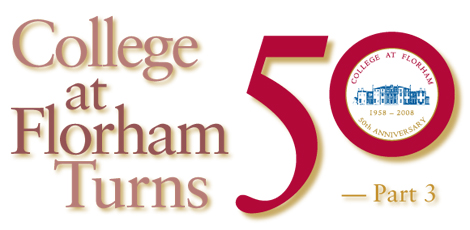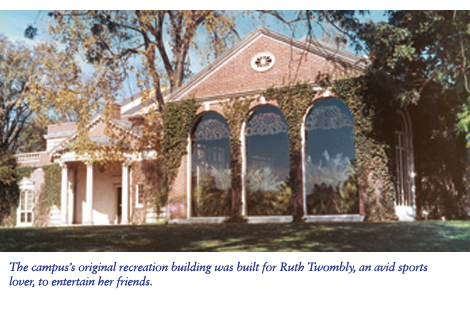


Life on Campus
University life in the early days of the Madison Campus was quite an experience. As was required by the University in those times, men wore jackets and ties to class, and women wore dresses or skirts and blouses. “The girls had the third floor [for dormitories],” recalls Patricia Moran, BS’63 (M), MBA’73 (T), who hailed from Ireland and was perhaps the campus’s first international student. “In our day we had a curfew, and we had a housemother.” Women were not permitted to go out at night or leave their dorm rooms after curfew.
The men, including Maher, were housed in the left-hand wing of the Mansion, which formerly served as the Twomblys’ servant quarters. “The rooms were rather stark and, although freshly painted, had all the appearances of an old building,” he recalls. “There were no refrigerators in rooms, and of course no telephones. I remember there was a pay phone at the top of the stairs, near Hartman Lounge.”
“There was a dumbwaiter that came up to each floor,” Moran says. “When we wanted pizza we would call the boys [on the pay phone], and they would go out and get it and send it up on the dumbwaiter. That was the only treat. There were no [vending] machines.”
The Mansion’s organ, with its pipes extending up into the second-floor lounge outside the former master bedroom suite, is also fondly remembered. “There was a student who used to come in on Sunday morning and play it,” recalls Moran. “When you came down in the morning, the whole Mansion was filled with the music.”
“I have the dubious distinction of having turned more old estates into colleges than any other person in the history of education.”
— PETER SAMMARTINO, Of Castles and Colleges
With the beauty and splendor of the Great Hall, its magnificent staircase and the Mansion’s ballroom (Lenfell Hall), it was decided that the University’s annual Debutante Cotillion, in which women from all the FDU campuses were presented, would be held in the Mansion. As senior faculty members, Sturchio and Savage were called upon to announce the names of the debutantes as they made their appearances. But times quickly changed, and the debutante tradition was phased out of University life by the early 1960s in favor of more contemporary social activities.
Each fall, a period of freshman hazing (now no longer permitted) included requiring members of the incoming class to wear beanies in school colors; if caught without a beanie, they were subject to a variety of experiences, some designed to instill school spirit, such as singing a school song or reciting a piece of school history. The most daring of hazing pranks was when a boy was challenged “to sneak up the dumbwaiter and grab panties,” recounts Moran. (Panties were often left hanging to dry in the one third-floor bathroom that the ladies shared.) “That was the big thrill,” she laughs.
In the early years, much of the campus remained just as the Twomblys had left it. “I remember exploring parts of it, especially when I first arrived,” Maher relates. “Many of the rooms still had the fabric wall coverings and the bathrooms had the original fixtures. We found a barn filled with animal trophy mounts. There were moose, deer, bear, buffalo and other large animal trophies down to smaller game animals and birds.”

The Playhouse was an architectural masterpiece that contained an indoor clay tennis court as well as a heated Grecian swimming pool enclosed with grand, arched windows and mural-covered walls and filled with beautiful potted trees. “It was so nice in the wintertime,” remembers Moran. “You would look out the window and see somebody in the snow walking over toward the Playhouse with a towel thrown over their shoulders. It was lovely being there in the winter, when windows would all fog up with the steam.”
There was a lounge in the Playhouse that was used for events, student government and meetings. Maher recounts, “One of our first socials was held in the Playhouse. It had a beatnik theme and a poetry contest was held. We listened to Jean Shepherd on the radio,” in his nightly broadcast on WOR AM. (Shepherd, a popular humorist and social commentator of the times, later became well known as the narrator of the 1980s holiday movie “A Christmas Story.”)
The Playhouse also served as a base for the campus athletics program. It was there that the late Robert Shields, director of athletics and soccer, basketball, golf and lacrosse coach, had his office. Maher recalls with fondness, “I had the privilege of playing soccer for Coach Shields. He was a teacher with extraordinary talent and knew the game well.” Shields, who remained connected with the University even after his retirement in 1988, was honored with the dedication of the campus’s football field in his name in 1996 and a memorial plaque last fall.
Maher also warmly remembers his academic adviser, Louis Rice, (for whom the present day Rice Lounge in the Martin F. Stadler, Patrick J. Zenner, Hoffmann-La Roche Inc. Academic Building is named). The Madison Campus offered a full array of undergraduate programs from its beginning; but because of its small enrollment and the relatively few full-time faculty members on campus, scheduling could be quite tricky. As one of only two economics majors on the campus in its first years, Maher feels he “was very fortunate” to have this associate professor of business administration negotiate for him to complete some of his required courses at FDU’s campus in Teaneck. “He was a man truly interested in his students,” he says. “Dr. Rice was accessible and wise and had a knack of getting to the heart of the matter.”
Article Opening | Class Is in Session | Coming of Age
Web Exclusive Memories of Florham
Florham Today and Tomorrow

FDU Magazine Home | Table of Contents | FDU Home | MyFDU.net | Blog About It
©Copyright 2009 Fairleigh Dickinson University. All rights reserved.
For a print copy of FDU Magazine, featuring this and other stories, contact Rebecca Maxon, editor,
201-692-7024 or maxon@fdu.edu.